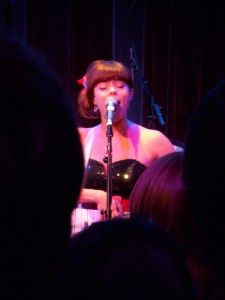Upon first listen, Lenka’s “Trouble is a Friend” both encapsulated and negated my thoughts on modern music. Low-fi instrumentation and mumbled lyrics are the latest trends in popular music – serious trouble – and yet, I still pursue my thirst for new music because it has been such a friend in the past.

At the same time, however, Lenka, who definitively articulates both instruments and lyrics, underscores a trend in the other direction. Lenka gives hope to music lovers like me with her skillful sets, mastery exemplified at Berklee College’s Café 939 in June.
In a closely-packed room of 100, Lenka opened with “Two,” a propulsive celebration of the perks of love, energized by acoustic guitar shuffles and hand claps. The entire audience reciprocated the energy immediately, despite the age ranges in the room, a testament to Lenka’s infectious personality. She’s bubbly on stage, mirroring the enthusiasm of many of her songs, but also emulating the showmanship of The Beatles, whose effervescence and music she’s obviously influenced by.
Yet, Lenka’s ability to annunciate all of her lyrics most distinguishes her from much of today’s music. Singing intelligibly seems an obvious goal for all musicians, but in a market where fuzzy distortion is all the rage, lyrics are often put on the back burner.
Thankfully, Lenka echoes the golden age of lyricism and is able to effectively communicate with her audience. As a result, the Berklee listeners were able to empathize with Lenka, especially on songs like “Don’t Let Me Fall,” whose sweet promise of devotion endeared the audience because they understood exactly what she was singing about.
Lenka’s classy suit-and-sunglasses-clad band charmed the audience further. Skilled instrumentation kept the band incredibly tight, as did the flawless drum sound emitted from the small kit. The Fender bass lines were also remarkably clear and more prominently featured than in contemporary ensembles, a refreshing change to a treble-focused market. Lenka’s trumpet accompaniment additionally distinguished her set and added delicious “Penny-Lane”-like lines on songs like her latest, “Roll with the Punches.”
However, Lenka’s appeal comes not in what distinguishes her, but what makes her the same as the audience. While classically trained, her voice has a tinge of street-performer whine on its edges, as if her entire act is encased in a hometown upbringing.
Even while working through her polished performance, she danced on a whim, cutely shook her head and smiled on climaxes of enthusiasm, winked and rolled her eyes, evidence she enjoyed the performance just as much as her viewers. Lenka even threw candies out to invigorate her audience because Café 939 “can’t serve alcohol,” confirmation that Lenka’s career hasn’t overshadowed small-town roots, an allegiance the audience could sense and appreciate.
If only more would appreciate Lenka. Her commercial success thus far has been limited to soundtracks on advertisements and television programs, but sustained by a handful of fiercely supportive fans. Hopefully, a circuit of small performances like that at Berklee’s Café 939 will help increase the exposure she deserves, especially as she battles the formidable bulwark of the status quo.























































































































